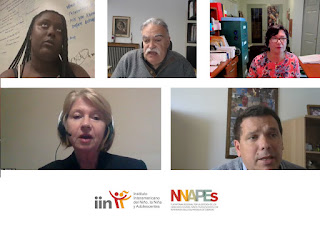Esta organización fue creada en 2006 en Altos de Cazucá, precisamente en el barrio de Soacha, ubicado en la periferia de Bogotá, a partir de las problemáticas que vivían y viven los niños, niñas y adolescentes en esa zona. Desde sus inicios, el fútbol fue una herramienta para la inclusión social, que forjó la misión de la Fundación: activar el poder del juego para generar esperanza, autonomía y pertenencia. Actualmente, la organización desarrolla más de 20 propuestas, nucleando a más de 1500 niños, niñas y adolescentes.
NNAPEs en Inglés
miércoles, 26 de octubre de 2022
La Plataforma NNAPES incorpora nueva integrante: Fundación Tiempo de Juego de Colombia
ACIFAD lanza video "¿Qué llevan en las mochilas?"
jueves, 15 de septiembre de 2022
Plataforma NNAPEs and the Inter American Institute of the Child (IIN-OAS) launch course on Children with Incarcerated Parents
martes, 30 de agosto de 2022
New course “Protection, promotion and fulfillment of the rights of children and adolescents with incarcerated adult caregivers”
Dialogue for the rights of children with adult referents deprived of liberty
As part of the launch of the “Protection, promotion and fulfillment of the rights of children and adolescents with incarcerated adult caregivers” course in english language of the Inter-American Training Program, the Inter-American Children´s Institute (IIN) invites a discussion on the rights of children and adolescents with relevant adults deprived of liberty.
The objective of this instance is to visualize and prioritize the specific problems of children and adolescents with adult caregivers deprived of liberty in the region, and identify potential actions of different nature that promote and protect the rights of these children and adolescents.
Exponents:
Opening Víctor Giorgi, Director General of the IIN-OAS.
Gonzalo Salles. Member of the Executive Secretariat of the NNAPES Platform.
PanelistsVivienne Chin – Senior Associate of the International Center for Criminal Law Reform and Criminal Justice Policy in Vancouver, Canada which is part of the Program of Network Institutes of the Crime Prevention and Criminal Justice Program of the United Nations Office of Drugs and Crime.
Representative of SUSU Youth Fellow and Youth Action Council Alumni.
Ann Shelton, Professor UNESCO Chair: Education Law in Africa, Faculty of Law University of Pretoria and member of the Committee on the Rights of the Child.
Registration form here
viernes, 26 de febrero de 2021
The Inter American Institute of the Child (IIN) of the Organization of American States (OAS) and the Plataforma NNAPES conducted the first pilot training course on Children with Incarcerated Parents for State officials in the Americas.
32 professionals from 11 countries (Argentina, Chile,
Colombia, Costa Rica, Ecuador, Guatemala, Honduras, México, Nicaragua, Paraguay
and Uruguay) finished the 7-weeks pilot online training that is now part of the
Institute´s Inter American
Training Program.
The objective of the course was to present the
specific challenges and needs that usually CIP in the region face and to
identify actions that can help to promote and protect their rights.
The course was officially launched with a webinar
that counted with the participation of Víctor Giorgi, IIN-OAS´s General
Director; Gonzalo Salles, from the Plataforma´s Executive Secretariat; Edith
Avendaño, a youth representative from Nicaragua; Ricardo Pérez Manrique, a
Judge of the Inter-American Court of Human Rights; and Luis Pedernera,
President of the United Nations Committee on the Rights of the Child.
The recording of the discussion is available here
(only in Spanish).
It is expected that during 2021 two more editions in
Spanish will be organized and that the contents will be translated to English
so the first edition for anglophone speakers can take place during the last
semester of the year.
Source consulted: IIN-OEA
jueves, 18 de junio de 2020
"Children and adolescents deprived of liberty or with incarcerated parents are among the most marginalized in the world"
Invisible children
Added to this, there is an impact on a psychological and emotional level, as well as the stigmatization they sometimes suffer. Among the findings, the study indicates that many children and adolescents deprived of liberty also have a father or relative in prison. In Uruguay, this situation was identified in 67% of cases.
The report affirms that this data shows the pernicious cycle that can trigger the entry to the justice system in childhood and this is one of the powerful reasons why it is urgent to adopt preventive measures and apply the principle of remission for juvenile offenders. In this sense, the document makes a series of recommendations to the States that focus on the protection of children and adolescents regarding?? the penal system, in the establishment of supervision and surveillance mechanisms, in the training of personnel, in promoting data systematization and analysis, and in collaboration with local actors, civil society and the business sector.
Lastly, a greater investment in children and adolescents is suggested, a recommendation that is aligned with the United Nations 2030 Sustainable Development Goals.




